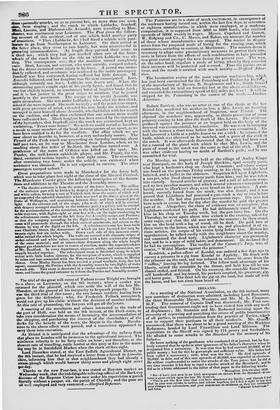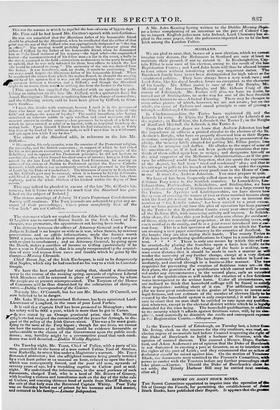IRELAND. IRELAND.
At a meeting of the National Association, on the 8th instant, many new members of distinction were admitted, including Lord Rossmore, the three Honourable Messrs. Westenra, and Mr. M. L. Chapman, M.P. The removal of Captain Duff was discussed ; Mr. Finn con- tending that Government ought not to have visited him with any mark of displeasure ; Mr. Staunton and Mr. Redmond insisting upon the necessity of reproving and punishing the errors of public functionaries of all parties, in contradistinction from the practice of Tories_vahrl.th was to support their partisans in all their misdeeds. Mr. Grata a announced, that there was about to be a grand meeting of the Wicklose Reformers, headed by Lord Fitzwilliam and Lord Miltown. The requisition to the Sheriff was signed by 174 gentry and freeholders. He alluded to some attacks in the Standard on the memory of his father— He knew nothing of the gentleman who conducted that journal, but lie fear- lessly asserted that he spoke in utter ignorance of his father's character when he designated him a mercenary. It was true that he had received 50,0001. of the public money ; but for this he gave ample and sufficient value. His father had been called a mercenary ; now, what was the fact ? He died upwards of 70,0001. in debt. and of this 140111 upwards of 30,0001. was expended in elections. lie seldom condescended to notice the attacks of the Tory press; but lie did at one time consider it his duty to repel a similar attack of the Standard; and he did so in a letter addressed to the editor of that paper in the following words.
Monaghan, 19th October 1831
" Sir—I have just seen in an Irish newspaper an extract from the Standard—it con. tains a gross attack upon the late Mr. Grattan. " This is not the first time that you have slandered my family ; and though I feel that in your case rebuke is useless, and reform hopeless. yet I feel it right to say that your charges are calumnious, and your statements as infamous as they arc tintouttll.ed and false. " mcgar GRAITAN,
This was the manner in which he repelled the base calumny of bygone days
Mr. Finn said he had heard Mr. Grattan's speech with satisfaction— Ile was not astonished that the illustrious father of his honourable friend should he attacked by the Standard, when he recollected that the editor of that print was the son of that G&W who was appropriately designated as " the doe- to aliee." The meeting would pruhably recollect the character given the father of Giffard by the father of his honourable friend, when he denounced him as " the hired traducer of his country—the legal rebel—the unpunished traitor—the excommunicated of his fellow men—a liar in the court, a bully in the street, a coward in the field—everywhere soobnoxious to the party besought to uphold, that he was only tolerated for those base offices to which the less vile would be ashamed to stoop." The animosity of the son was derived from the father. It was hereditary, and, no doubt, it would be everlasting. The S01) never could forgive the illustrioua father of his honourable friend. When he recollected the source from which the malice flowed, he thought the meeting old be of his opinion that it was not all surprising that there was nothing common between a Grattan and a Giffard ; and though the Standard might do its worst, there word", be nothing due from the former to the latter.
[This speech has supplied the Standard with an apology for pub- lishing an eulogiutn on the late Mr. Giffard, with a quotation from Sir Jonah Barrington's Memoirs, acquitting him of the charge of cowardice ; and the fallowing retort, said to have been given by Giffard, to Grat- tan's tirade— "I meet this slander with contempt, because I meet it in the preence of those who know me and know the slanderer. Who is he that talks of the field,' and maligns the name of loyalty? The sordid incendiary, who having stimulated an infuriate rabble to open rebellion and cruel massacre, hid his recreant carcass in another country—how presumes he to speak of a field into which he never entered as rebel or as loyalist, with an impartial treachery de- serting both. Upon himself I throw back iris foul calumnies; and, as I defy him here at the head of his seditious mob, so will I meet him in a wilderness, and spit upon him while I say belies."
The editor of the Standard adds, in reference to the late Mr. Gifrard- " His enemies, his only enemies, were the enemies of the Protestant religion, the numarehy, and the British connexion ; in support of which he had risked
his life in five private encounters, and in all the principal engagements of the
Rebellion ; and in support of his Protestant principles, he did not he.itate to sacrifice the office which formed his chief source of income; being in IS05 dis- missed by the late Lord Hardwieke, then Lord-Lieutenant, for moving an address of the citizens of Dublin to Parliament against the Roman Catholic demands, which address was unanimously carried, and presented in the House of Lords by the Duke of Cumberland. The bitterness of enmity to Irish rebels on Mr. Gittud's part may be excused, when it is known he lost by deliberate, cold. blooded murder, in the year 179, one son, two brothers-in-law, three nephews, and in the whole thirteen of his kindred within the degree of first cousin."
This may indeed be pleaded in excuse of the late Mr. Giffard's bit- terness; but it forms no excuse for much that the Standard has pub- lished on tire subject of Ireland.] The riotous meetings of Johnny M•Crea's Protestant Confederation Society still continue. The Tory journals are ashamed to print any ac- count of their proceedings ; which prove completely that all the " low Irish " are not Catholics.



























 Previous page
Previous page